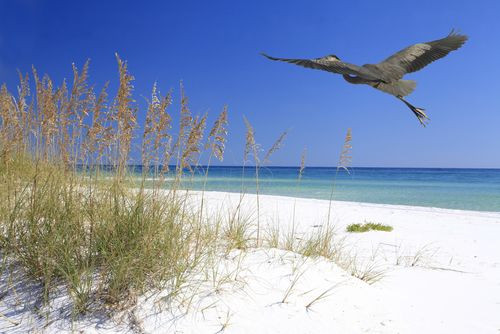Flesh-Eating Bacteria Found In Florida Seawater Forces Officials To Caution Locals And Tourists Alike

Is there anything quite as lovely as a Florida beach? Unfortunately, looks (and warm temperatures) may be deceiving, as Florida’s Department of Health has begun to warn people of a naturally occurring yet potentially deadly bacteria that thrives in warm seawater. In rare cases, the bacteria, known as Vibrio vulnificus, can cause serious illness and even death. According to the Centers for Disease Control and Prevention, an average of 50 culture-confirmed cases, 45 hospitalizations, and 16 deaths are reported each year from the Gulf Coast region (Alabama, Florida, Louisiana, Mississippi, and Texas). Nationwide, there are as many as 95 cases (half of which are culture confirmed), 85 hospitalizations, and 35 deaths. Infections usually occur (85 percent) between May and October.
Those who eat contaminated seafood may suffer vomiting, diarrhea, and abdominal pain, while those with an open wound exposed to seawater may develop a skin infection, which could lead to blisters. Half those who experience the bacteria entering their bloodstreams die. Public health officials say people with weakened immune systems, such as those receiving chemotherapy for cancer, as well as those with chronic liver disease, are 80 times more likely to develop an infection in their bloodstreams than healthy people. Importantly, no evidence exists of person-to-person transmission of V. vulnificus — you will not contract any illness by coming into contact with someone who is sick.
If you suspect infection, you should get medical attention immediately and begin treatment as soon as possible because antibiotics improve survival. In fact, the CDC recommends aggressive attention be paid to the wound site as amputation of an infected limb is sometimes necessary.
To avoid this unseen and generally unexpected threat, the Florida Department of Health offers these tips for preventing infections:
- Do not eat raw oysters or other raw shellfish.
- Cook shellfish (oysters, clams, mussels) thoroughly.
- For shellfish in the shell, either a) boil until the shells open and continue boiling for 5 more minutes, or b) steam until the shells open and then continue cooking for 9 more minutes. Do not eat those shellfish that do not open during cooking. Boil shucked oysters at least 3 minutes, or fry them in oil at least 10 minutes at 375°F.
- Avoid cross-contamination of cooked seafood and other foods with raw seafood and juices from raw seafood. Use separate cutting boards and wipe counters clean after use.
- Eat shellfish immediately after cooking and refrigerate leftovers.
- Avoid exposure of open wounds or broken skin to warm salt or brackish water, or to raw shellfish harvested from such waters.
- Wear protective clothing (such as gloves) when handling raw shellfish.
Published by Medicaldaily.com



























